The Gospel according to Frozen II (or, why Elsa is Jesus)
(This post contains spoilers. Go watch "Frozen II" before you read it)
Introduction and thesis
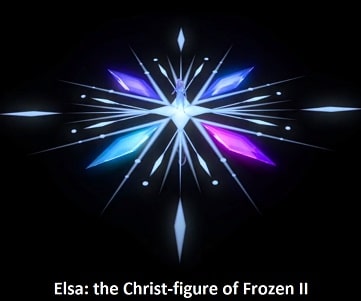
Frozen II is a carefully crafted movie. Some viewers have found it to be confusing, but this is actually due to the profound depth of its mythology. This movie is put together like a puzzle: it may initially seem haphazard and muddled, but with deeper understanding comes clarity, simplicity, and meaning.
For instance, I've previously explained how Ahtohallan is the God of the "Frozen" universe. I recommend reading that as a prerequisite to this post. Understanding that point will dispel much of the confusion around the movie, and answer most of the common questions about it.
And yet, 'Ahtohallan is God' is not the movie's final meaning: even this serves to point to something deeper still. At that deepest level - at the very heart of the movie - is the Christ-figure of the story. This is the character we really need to understand to grasp the true essence of the film. For everything about Frozen II - its whole world and plot - is built from the ground up with a singular purpose, to place this Christ-figure character at the very center of the story.
Who is this character? Who else could it be but Elsa? Frozen II is fundamentally about her: her calling, her journey, her transformation and acceptance into her true role in the universe. And Elsa is Jesus: her identity and role as the Fifth Spirit is exactly analogous to Jesus's identity and role in the real world.
The entire movie is then constructed to make that very analogy. Don't believe me? A deep music beats at the heart of this claim. Let us follow its call.
Fairest Lord Jesus
Vuelie is the most profound song in Frozen II. It explains everything about the movie, and serves as its core inspiration. It's the only song to be wholly carried over from Frozen I, it featured prominently in the first trailer for Frozen II, and it's played a grand total of three times in Frozen II itself. No other song is played so completely so many times, in Frozen II or in the whole franchise. This is no accident. You don't play the same song three whole times in a single musical, including at its very beginning and very end, unless it's absolutely central to your work.
Now, dedicated fans will already know that Vuelie is based on the hymn "Fairest Lord Jesus". You can kind of hear the similarities in some parts of the melody, and it is absolutely unmistakable in the full version of the song. Vuelie has no decipherable lyrics, so we naturally look to "Fairest Lord Jesus" for its meaning.
Of course, this song is about Jesus, as its title suggests. It has many extended versions that iterate on its themes, but the core message of the song can be found in the simple original lyrics:
Fairest Lord Jesus, Ruler of all nature,
O Thou of God and man the Son,
Thee will I cherish, Thee will I honor,
Thou, my soul’s glory, joy and crown
Beautiful Savior! Lord of all the nations!
Son of God and Son of Man!
Glory and honor, praise, adoration,
Now and forever more be Thine.
What does this song say about Jesus - and by extension, about Elsa? What identities and roles does it ascribe to him? When you strip it of its artistic flourishes, it says that Jesus is:
1. Son of God
2. Son of Man
3. Ruler of all nature
4. Lord of all the nations
And, by God, is that not the very story of Frozen II? Let me explain.
First, consider the world-building for the movie. If your goal was to tell the story of "Fairest Lord Jesus", with Elsa as the Christ-figure, then what is the minimum set of components you would need to build for this world? You would need:
1. "God" ("Son of God")
2. "Man" ("Son of Man")
3. "nature" ("Ruler of all nature")
4. "nations" ("Lord of all the nations")
And what new components did we actually get in Frozen II?
1. Ahtohallan ("God")
2. the expanded backstory of Elsa's ancestors: Agnarr, Iduna, and Runeard ("Man")
3. the four elemental spirits ("nature")
4. the Northuldra ("nations")
You see how every single one of these is constructed to mirror the parts of "Fairest Lord Jesus"? But that's not all. Once the movie's world is built this way, the plot must follow: Frozen II is about how Elsa - the Christ figure of her universe - finds her dual identity, as:
1. Daughter of Ahtohallan ("Son of God")
2. Daughter of Humanity ("Son of Man")
She then goes on to fulfill her two roles, of becoming:
3. Queen of the Elements ("Ruler of all nature")
4. Leader in both Arendelle and the Enchanted Forest ("Lord of all the nations")
So the movie's entire world and plot are outlined point-by-point in Vuelie/Fairest Lord Jesus. But we're just getting started, and this is a lot to take in. Every single one of these points merits an extended discussion. So let's break this down component by component - "Son of God", "Son of Man", "Ruler of all nature", and "Lord of all the nations" - and see how each of these applies to Elsa.
"Son of God"
Who, and what, is Elsa?
I've mentioned that I've written a post explaining how Ahtohallan is God - which I again recommend you read, as it serves as a prerequisite for this post. Some of my following claims may not make sense otherwise. In any case, the relevant key points from that post are as follows:
Elsa is the Fifth Spirit in a manner analogous to the other elemental spirits: meaning, she is the representative, or incarnation, of the divine "fifth element" - the element associated with the God "Ahtohallan". That is, just as Gale IS air, and Nokk IS water, Elsa IS Ahtohallan. They are of the same element. Air from air. Water from water. And so, magic from magic, and God from God.
Likewise, Jesus is of the same substance as his Father: God from God, Light from Light, true God from true God.
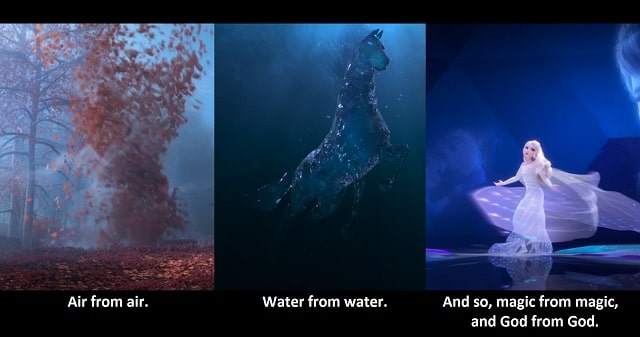
Furthermore, Ahtohallan is Elsa's "mother" in a couple of different ways: one, because Elsa is the incarnation of Ahtohallan, and therefore 'descended' from it and one in essence with it. And two, because Elsa's birth was determined by Ahtohallan, in that it chose Iduna as the one to give birth to the Fifth Spirit. This makes Elsa the "daughter" of Ahtohallan.
Jesus is also the "Son of God" in similar ways: one, because he is eternally begotten of the Father and therefore of one essence with him. And two, because his birth was determined by God, in that his mother the virgin Mary conceived him by the power of the Holy Spirit.
So as in the song, Elsa is the "Daughter of Ahtohallan" in a manner analogous to how Jesus is the "Son of God": the incarnation and representative of divinity, of the same substance and sharing in one essence with it.
"Son of Man"
Of course, Elsa is also fully human.
The movie spends quite some time filling in the story of her ancestors. She is the child of Agnarr and Iduna, descended from both Arendelle and Northuldra. She is a representative of both people, which together form the whole of 'humanity'.
But perhaps her most important ancestor is King Runeard, whose original sin triggered the initial catastrophe of the movie. From the perspective of all outsiders - the Northuldra, the elemental spirits, and Ahtohallan - there were two important Arendellians who established a new kind of relationship with them. The first was King Runeard. The second, and last, is Queen Elsa.
Similarly, Jesus's most important ancestor is Adam, whose original sin triggered the fall of humanity. From God's perspective, there were two important humans who established a new kind of relationship with him. The first was Adam. The second, and last, is Jesus Christ.
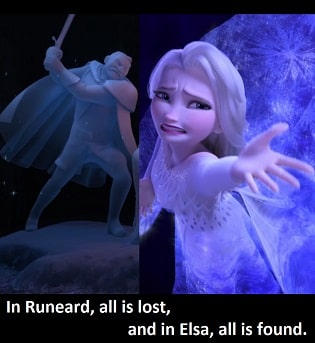
King Runeard - the 'first Arendellian' - murdered the Northuldra leader, and brought tragedy into the story. Through this one man, sin entered and killed the relationships between Arendelle and all outsiders, ruining everything. But Queen Elsa - 'the last Arendellian' - became a life-giving spirit, and restored that relationship. So in Runeard, all is lost, and in Elsa, all is found.
Likewise, Adam - the 'first man' - violated God's direct command, and brought sin into the world. Through that one man, sin - and its consequence, death - spread to everyone, and ruined everything. But Jesus Christ - the 'last Adam' - became a life-giving spirit, and restored our relationship with God. For in Adam, all die, even as in Christ all shall be made alive.
So in accordance with the song, Elsa is the "Daughter of Humanity" in the same way that Jesus is the "Son of Man": the child of ordinary human parents, born to right an ancestral wrong - and representing all of humanity through that ancestry.
"Bridge"
Elsa, together with Anna, is the Fifth Spirit - the bridge between humanity and the magic of nature.
This is only possible because of the dual nature of the Fifth Spirit: because the bridge has two sides, in each of its two identities. This dual nature is represented in multiple ways: Elsa is magical, and Anna is ordinary. They're also descended from two separate lineages: the more magical Northuldra, and the more ordinary Arendelle. Lastly, Elsa herself is a magical spirit of the divine element, but also fully human, being descended from Agnarr, Iduna, and Runeard. She is both the "Daughter of Ahtohallan" and the "Daughter of Humanity".
The imagery of the bridge - and specifically, the title of "The Great Bridge-Builder" - is very old, and has a lot of history behind it. In fact, you may recognize that title better in its Latin form: Pontifex Maximus.
In the days of ancient Rome, the "Pontifex Maximus" was their "greatest priest". That is what the words literally mean. A moment's reflection here will tell you that "pontifex" then must mean both "priest" and "bridge-builder". And of course, that makes sense. Priests are those who bridge the divide between gods and men, and act as the mediator between them. The Catholic Church later used "Pontifex Maximus" as a title for the Pope - you may recognize "Supreme Pontiff" as being essentially the same in meaning.
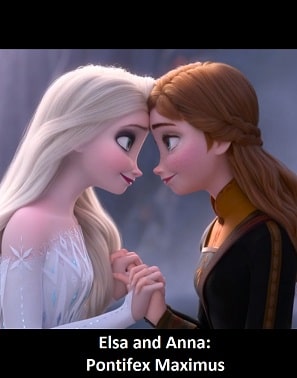
Given all this, are you at all surprised that Jesus, too, has been identified as a bridge between his two natures, since the earliest days of Christianity?
Jesus is both God and Man. From his Father, he is fully divine and perfectly God. From his human mother, he is fully human and perfectly man. As "Fairest Lord Jesus" says, he is the "Son of God and Son of Man". His dual nature uniquely allows him to bridge the gap between God and man, serving as the mediator between them. Through him we have access to God, and the ability to approach him with confidence. For these reasons we say that Jesus is our Great High Priest - the Great Bridge-builder.
So like Jesus, Elsa (together with Anna) is the bridge - having two natures, touching two sides, and uniquely able to connect humanity to divinity.
"Ruler of all nature"
So we now understand Elsa's identity, as the bridge between the two sides of her dual nature. But how does she fulfill that identity? What is her role?
One of her goals as the Fifth Spirit is to restore nature's harmony.
In the beginning, in the Enchanted Forest, people lived in accord with the elemental spirits of nature. It was charming and magical. But Runeard's original sin caused the elemental spirits to become enraged, and since then, they have become hostile towards all humans - some murderously so.
Likewise, in the beginning, in the Garden of Eden, Adam and Eve lived in harmony with nature. It was "very good". But Adam's original sin caused nature itself to be cursed and corrupted, and since then, humans and nature have been at odds against each other.
But Elsa is the Fifth Spirit. She is the rightful ruler over the elements. As the center of the symbol of elemental unity, she is the one to whom they all need to be aligned. As such, the enraged elemental spirits are naturally and quickly tamed by her.
Similarly, Christ is the Creator. He is the rightful ruler of nature. As the firstborn over all creation, he is the one by and for whom all things were created. As such, nature itself longs to be set right and reconciled to God through his redemptive work.
So like in the song, both Jesus and Elsa are the "Ruler of all nature"- the one who restores nature and reconciles with it.
"Lord of all the nations"
The second goal of the Fifth Spirit is succinctly stated by Queen Anna at the end of the movie, in her role as the 'human' half of the Fifth Spirit: "our lands and people, now connected by love".
Elsa and Anna brought reconciliation and unity among the peoples. They are descendants and heirs to both Arendelle and Northuldra, and the two people are united in the two sisters. In them there is no distinction between Arendellians and the Northuldra: they are one in the Fifth Spirit.
Christ too came to bring reconciliation and unity among all people. We are all descendants and heirs to God's promises, and all united in Christ as God's people. In him, there is no distinction between Jew or Greek, slave or free, or male or female: we are all one in Christ.
The sisters have dispelled the dividing mist, and destroyed the dam of enmity that kept the two peoples separate and hostile. In so doing they've reconciled and united both peoples to themselves, thus making peace. Likewise, Jesus has destroyed the barrier, the dividing wall of hostility, that set our ethnic, economic, or gender differences against one another. In so doing he has reconciled and united all people onto himself, thus making peace. So like in the song, both Jesus and Elsa are the "Lord of all the nations", in leading them to reconciliation and unity.
Back to Vuelie
These are major themes in Christianity. Look through the links I provided above: most of them are to crucial Bible passages, or to important creeds. So these are not trivial connections between Jesus and Elsa. "Fairest Lord Jesus" really does describe some of the most important things about Jesus, and it lines up perfectly with the most important things about Elsa.
This is what makes Vuelie the most profound song in Frozen II. With its meaning provided by "Fairest Lord Jesus", Vuelie outlines the whole movie. But that's not all: for this not only explains every major theme, plot, and world-building component of Frozen II, but also its perceived flaws.
Have you wondered why Frozen II doesn't develop any of its new characters very much? Or why it doesn't explore the heavy topics it touches on, like ethnic bigotry? Because such things were never meant to be the main focus: the actual purpose of the Northuldra, and new characters like Lieutenant Matthias and Yelena, is limited to supporting the "nations" component in "Fairest Lord Jesus".
Have you wondered why Frozen II didn't cut any of its numerous new components, leading to the criticism that its mythology is too crowded? For example, in terms of streamlined storytelling, it may have been cleaner to do without Ahtohallan altogether. It could have simply employed something like a 'temple of the elements'. But the movie consistently portrays Ahtohallan as something that is related to, yet stands apart from, the four elements. It has its own rules, its own song ("All is Found"), and its own mythology. Why? Because you can't betray your core inspiration. So the movie couldn't abandon any of the components in "Fairest Lord Jesus", even if this leads to a crowded mythology.
Have you wondered why there are so many difficult and confused questions around Ahtohallan and the Voice calling Elsa? Because they are the "God" component of the story, and as such are the most mysterious and abstract.
In this way, everything about the movie - including even its weaknesses - can be explained with Vuelie, with Elsa as the Christ-figure of "Fairest Lord Jesus". But there's still more: consider WHEN Vuelie is played. It featured prominently in the first trailer, and it's played at the very beginning of the movie. This establishes at the start that Frozen II is going to be fundamentally about this song, about the "Son of God and Son of Man". This is Elsa's identity - and as such, the rest of the movie is about how she goes on to fulfill the two roles specified in the song: to become the "lord of all the nations" and "ruler of all nature".
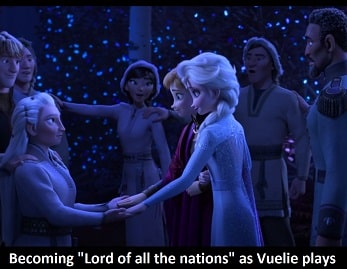
The next time we hear Vuelie is when the Northuldra sing it to Elsa and Anna, as they accept the two sisters into their tribe. This instance of the song is bracketed by two events: right before, Elsa announces that "our mother was Northuldra". And right after, she promises that "I will free this forest, and restore Arendelle". What is she doing? She is fulfilling one of the two Christological roles in the song. As Jesus is "Lord of all the nations", Elsa is becoming the leader, reconciler, and uniter of Arendelle and Northuldra, in announcing that she is descended from both peoples, and promising to solve both of their problems.
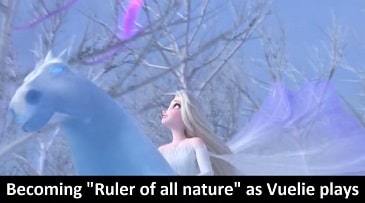
The last time that the song is played is at the very end of the movie. Elsa is travelling to Ahtohallan, and the four elemental spirits are finally all in harmony with her, each paying tribute to her through their service and affection. Again, what's going on here? She is fulfilling the second Christological role in the song: as Jesus is the "Ruler of all nature", Elsa is finally taking her place as the Queen of the Elements.
And - that's the whole movie. It's a story about how the Fifth Spirit - the child of both humanity and divinity - makes peace between the nations, and restores nature. It's about how the "Son of God" and "Son of Man" becomes the "Lord of all the nations" and "Ruler of all nature". It's all laid out in this song. Like "All is Found", Vuelie serves as the blueprint for the entire film - except on a far deeper, broader level. Together, they point to the idea that Ahtohallan is God, and Elsa is Jesus.
Miscellaneous evidence
Of course, if Elsa really is the Christ-figure of her universe, and the whole movie is constructed to make that analogy, you would expect further corroborating evidence sprinkled throughout the movie in small, less meaningful ways - and that is exactly what we find.
Like Jesus, Elsa walks on water. That was a cool scene at the Dark Sea. She also raises Olaf back from the dead, like how Jesus raised some of his friends. Of course, she is herself resurrected after being frozen in Ahtohallan. In any given work of fiction (including Frozen I), it's a fair guess that the character that comes back from the dead is the Christ-figure of that story.
Additionally, one of the most striking images of Elsa is her as a white rider, saving Arendelle from its destruction at the end. This depiction fits well with how Christ will appear at the end of the world, when he returns as a rider on a white horse. Her dress here is also full of meaning, bearing many symbols which point to Elsa's true nature, some of which is only known to Elsa herself.
But perhaps the key scene in this category happens after Elsa and Anna run out of their parent's shipwreck. The sisters just learned that their parents were heading for Ahtohallan, searching for answers about Elsa's powers. Elsa, feeling responsible for their deaths, becomes upset. Anna and Elsa then have this conversation, which is incredibly dense in its references to Jesus:
Anna: Yelena asked, why would the spirits reward Arendelle with a magical queen? Because our mother saved our father. She saved her enemy. Her good deed was rewarded with you! You are a gift!
Elsa: For what?
Anna: If anyone can resolve the past, if anyone can save Arendelle and free this forest, it's you! I believe in you, Elsa. More than anyone or anything.
So, Elsa is born as a gift, out of love for an enemy - and Anna responds to her by believing in her. The parallels with Jesus are clear: he, too, was born as a gift, out of love for God's enemies - and we respond by believing in him.
Titles for Elsa
All this gives Elsa the right to bear some new titles. Some fans have taken to calling Elsa a "goddess", but I often reply that she is at LEAST that: "goddess" is in fact too low of a title for her. Elsa is the Christ-figure of her universe, and there is NO title which is too lofty for her. To her belongs the name above all names, and all the most beautiful, most excellent titles. Like the "Son of God", Elsa is Quintessence Incarnate, and the Daughter and Avatar of Ahtohallan. Like the "Son of Man", Elsa is the Daughter of Humanity, of both Arendelle and Northuldra. Jesus and Elsa are both the Pontifex Maximus, who bridges the two sides of their dual nature. As Jesus is the "Ruler of all nature", Elsa is the Queen of the Elements, and as Jesus is the "Lord of all the nations", Elsa is the former Queen of Arendelle, and Protector of the Enchanted Forest. In this way, her roles and identities correspond to each of the descriptions of Christ in "Fairest Lord Jesus".
And that is the heart of the movie. The person and nature of the Fifth Spirit is what explains everything else about the story. Likewise, the Incarnate Jesus Christ - God himself becoming flesh and dwelling among us - is the very heart of Christianity. The Incarnation is the miracle that explains all other miracles, and everything else about our universe. So in these deepest issues about the person of primary importance, Frozen II and Christianity are in full agreement. "Thee will I cherish, Thee will I honor, Thou, my soul’s glory, joy and crown".
Show Yourself
Now, you may have already read The Gospel according to Disney's "Frozen", in which I said that in Frozen I, we (humanity) are Elsa. But how could that be, if Elsa is Jesus? Well, it's possible for interpretations to change between a movie and its sequel, but I think there's a simpler answer: both interpretations are true.
Obviously, Jesus is unique and no other human should claim to be him. Fortunately, Christ's warnings on this are clear, and sane people generally don't need to worry much about making that mistake. However, while we can't claim to be Jesus, we Christians are to imitate him - to follow his example and try to become more like him. And how far can we go in this endeavor? Every Biblical answer here seems to be "far more than what you thought possible". And so, both of the above interpretations are true: Elsa is Jesus, and also us Christian imitating him.
This means that every major beat in Elsa's story is ours as well, in our journey to become more like Jesus. We are called to a great adventure - to leave behind our old life, and follow the divine call into the unknown. We are to carry out the ministry of reconciliation - between people, nations, and all of nature. We search after the reason for our being, and the answer we've waited for all of our lives. And we, vicariously through Christ, can even claim the superlative calling and powers of the Fifth Spirit, described in the very climax of the movie.
So, are you found in Christ? Then:
Show yourself. You are the light of the world. You should not and cannot hide.
Step into your power. The same power that raised Christ from the dead is within you, and all authority in heaven and earth is behind you.
Grow yourself into something new. You are a new creation in Christ, growing from glory to glory in becoming more like him.
You are the one you've been waiting for all of your life. You are God's handiwork, created in Christ Jesus to do good works, which God prepared in advance for you to do.
So show yourself. Let your light shine, that people may see your good deeds and glorify your father in heaven.
If you felt any love for Elsa, or any kinship or empathy with her as she accepted who she is as the Fifth Spirit, those feelings are not to be confined to just the movie. Her identity and roles are real in our world, and they are yours as well in Jesus Christ.
So that's the story of "Frozen II". Elsa is Jesus: the child of both divinity and humanity, bringing reconciliation to every people and all of nature. For anyone in Christ, that work is our work as well, as we love and emulate the Son of God and Man. And so, in this way, "Frozen II" echoes, quite directly, the one eternal story in all of existence.
You may next want to read:
Leave a Reply
You must be logged in to post a comment.
Post Importance
Post Category
• humanities (22)
• current events (26)
• fiction (10)
• history (33)
• pop culture (13)
• frozen (8)
• math (57)
• personal update (19)
• logic (65)
• science (56)
• computing (16)
• theology (100)
• bible (38)
• christology (10)
• gospel (7)
• morality (17)
• uncategorized (3)